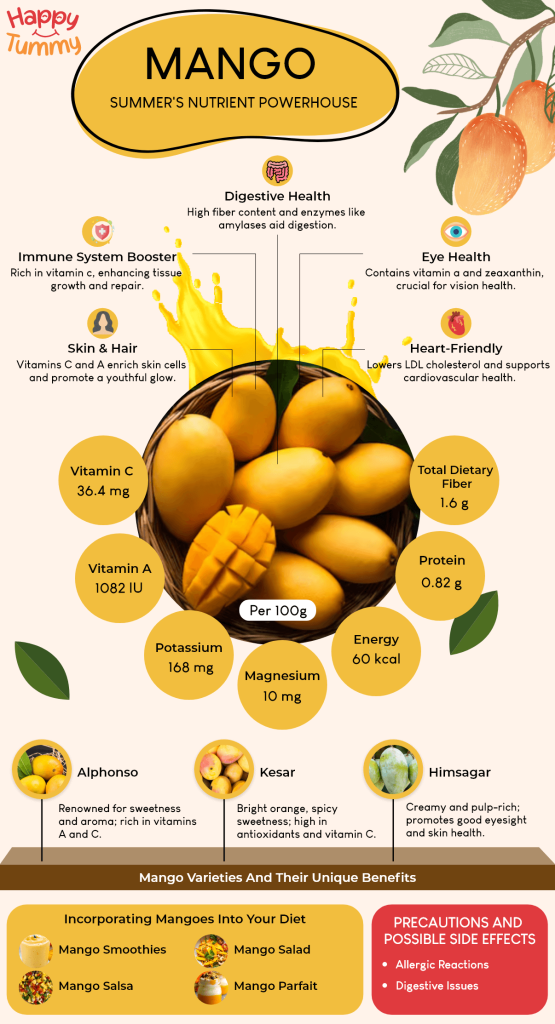Table of Contents
Dive into the vibrant world of mangoes, for surely no other summer super fruit can compete.
It is more than the taste and really rewarded with a true bounty of the numerous health boons.
Mangoes are called “the king of fruits” for a reason; they depict the glory of summer plenty and scream “nutrient treasure” in every bite.
Nutritional composition of mango pulp [2]
| Nutritional Component | Composition (Per 100 g of Mango Pulp) |
| Water (g) | 83.46 |
| Energy (kcal) | 60 |
| Carbohydrates (g) | 14.98 |
| Protein (g) | 0.82 |
| Total Lipid (Fat) (g) | 0.38 |
| Sugars, Total (g) | – |
| Total Dietary Fiber (g) | 1.6 |
| Minerals | |
| Calcium (Ca) (mg) | 11 |
| Iron (Fe) (mg) | 0.16 |
| Magnesium (Mg) (mg) | 10 |
| Phosphorus (P) (mg) | 14 |
| Potassium (K) (mg) | 168 |
| Sodium (Na) (mg) | 1 |
| Zinc (Zn) (mg) | 0.09 |
| Copper (Cu) (mg) | 0.04–0.32 |
| Selenium (Se) (µg) | 0–0.6 |
| Vitamins | |
| Vitamin C (Total Ascorbic Acid) (mg) | 36.4 |
| Thiamin (mg) | 0.028 |
| Riboflavin (mg) | 0.038 |
| Niacin (mg) | 0.669 |
| Pantothenic Acid (mg) | 0.119 |
| Folate, Dietary Folate Equivalents (µg) | 43 |
| Vitamin A, Retinol Activity Equivalents (µg) | 54 |
| Vitamin E (Alpha-Tocopherol) (mg) | 0.9 |
| Vitamin A (IU) | 1082 |
| Vitamin K (Phylloquinone) (µg) | 4.2 |
| Organic Acids | |
| Citric Acid (%) | 0.7 |
| Malic Acid (%) | 0.5 |
Historical Significance of Mangoes
Mangoes have a history that traces back more than 4000 years. With them, they carry more than just such a rich history but tales of joy, prosperity, and love from their home in South Asia.
Since people journeyed and traded across continents, the mango came along and was nestled in the hearts of many, from Africa and the Middle East to the Americas. From just plain fruit, mango has developed into a world ambassador to unite people from oceans and cultures to share happiness. Wherever they landed, it seemed the people of that area would have an exclusive way of embracing them into their festivals, dances, dinner plates, and making them a staple.
In India, mangoes became popular and were revered as sacred. Aam ka patta is commonly used in religious ceremonies in different parts of the country.
Mango Varieties and Their Unique Benefits
| Mango Variety | Region | Unique Benefits & Nutritional Profile |
| Alphonso (Hapus) | Western India | Highly prized for its sweetness, richness, and strong aroma. Rich in vitamins A and C, helping improve eye health and immune function. |
| Kesar | Gujarat | Known for its bright orange color and spicy sweetness. Contains high levels of antioxidants and vitamin C. |
| Dasheri | Northern India | Sweet and aromatic with a hint of citrus. It offers a good fiber content for digestive health. |
| Langra | Northern India | Known for its fibrous and sour taste. High in vitamin C and fiber, supporting immune health and digestion. |
| Himsagar | Eastern India | Creamy, with a high pulp content and no fiber. It’s rich in vitamin A, promoting good eyesight and skin health. |
| Banginapalli (Banganapalli) | Andhra Pradesh | Sweet, yellow, and fiberless. Contains vitamins A, C, and E, supporting eye health, immunity, and skin health. |
| Neelam | South India | Known for its unique aroma and flavor. A good source of vitamins and minerals, particularly vitamin A. |
| Ratnagiri Alphonso | Maharashtra | Similar to Alphonso but specific to the Ratnagiri region. High in beta-carotene and antioxidants. |
Source: (Compiled from various internet sources)
Health Benefits of Mangoes

#1 Boost Immune System
Mangoes contain a lot of nutrients that play an immense role in boosting the immune system. As a matter of fact, a single mango can give you more vitamin C than your daily requirement. This vitamin, required for all tissue growth and repair; also performs an antioxidant role, as it protects cells from damage by free radicals. [3]
Last but not least, the essential mineral that mangoes bring to your immune health is potassium, with good amounts of magnesium. Their roles in the body guarantee overall state of balance in body fluid and function. Therefore, taking mangoes is one natural way of boosting immunity.
#2 Digestive Health
The fibre content in mangoes may contribute to the health of the digestive system. Fibre adds to the bulk of stool, ensuring easy passage of wastes through the gut, hence preventing constipation.
Mangoes are also rich in digestive leutin which will break large food molecules into smaller and more absorbable ones. [4]
This improves digestion, as the body absorbs much of what has been taken as food. The benefits go from digestive wellness to good eyes, and also heart health.
#3 Eye Health
Mango contains vitamin A and zeaxanthin and is the superhero caretaker of your eyes. Vitamin A is crucial for vision as it saves dry eyes and may prevent cases of night blindness. [5]
One more component in mangoes is leutin zeaxanthin, which acts as a guard to harmful blue light, and may manage age-related degeneration.
#4 Mango for Heart Health
Mangoes are heart-friendly fruits with a great source of vitamins, minerals, and antioxidant flavonoids. All these—fibre, pectin, and vitamin C—contribute to lowering serum cholesterol, especially LDL or “bad” cholesterol. Meanwhile, potassium and mangiferin may assist in lowering inflammation and oxidative stress in the body, which is supportive of the heart and blood circulatory system. [6]
#5 Mango May Protect Skin and Hair
Mangoes are full of vitamin C for those looking to give their skin and hair a little beauty boost. Vitamin A also helps in the growth and repairs skin cells. Your skin may grow with a youthful glow and fight off from acne and aging signs. [7]
The antioxidants in mango may help to protect against cell damage caused by free radicals or oxidative stress. Taken together, these contents can prove phenomenal for your skin and hair.
#6 Mangoes and Weight Management
Mangoes may be an excellent addition to your weight management program. [8] The fibre improves digestion, ensuring that your body processes what you eat efficiently. Mangoes also contain other healthful nutrients that your body needs to maintain a healthy weight.
The fact that the mango is naturally sweet, as previously mentioned, is beneficial because it meets your desire for harmful artificial flavours. You can eat a mango when hungry and have nothing to chew on. If you prefer savouries, mango can fill you up for long enough to prepare a meal.
Aashirvaad provides an opportunity to optimize your diet’s nutritional quotient. Their “My Meal Plan” test, prepared by expert nutritionists, helps figure out the amount of fibre taken within a day and provides one with a well-tailored and suitable meal plan.
#7 Mangoes and Diabetes
Mangoes have a low glycemic index (GI), meaning they are less likely to impact blood sugar levels. It may be beneficial for individuals managing diabetes. The high-fiber content present in a few varieties, especially the Alphonso, may help regulate blood sugar by slowing down its absorption in the body. [9]
Mangiferin in mangoes may enhance insulin sensitivity, improving the body’s ability to absorb sugar. However, portion size and the context of the diet are important for people with diabetes when considering including mangoes in their diet.
Delicious ways to make mangoes part of your daily meals
- Mango Smoothies: Purée ripe mangoes with yogurt and a splash of milk for an exotic tropical refresher. Add ice to chill, honey for the sweet bit, and a sprinkle of cinnamon for the ‘last minute twist’ in the surprisingly delicious concoction. This smoothie is not only delicious but also a pack of nutrition.
- Mango Shake: Blend mangoes with milk to the consistency you look for! You may or may not add sugar. Add ice cubes, and you are good to drink this nutrient-rich delight!
- Mango Salad: Cube up some mango, slice some avocado, and red onion with citrus vinaigrette. This salad will please your taste buds as well as your eyes, combining flavors that are so refreshing and good for you.
- Mango Wraps: Add some thin slices of mango to your wraps or spring rolls to make them taste sweet. Mango, filled with veggies, will be a great contrast to the wrap. A mango-filled wrap might surprise your guests.
- Frozen Mango Treats: Pour the puree into popsicle molds and enjoy the delicious summer treat that will remind you of those hot summer afternoons in your childhood.
Selecting and Storing Mangoes
Pick ripe mangoes, not over ripe though. When squeezed gently, a ripe mango will yield, which will indicate its delicacy. The scent from the stem end is another indicator of a ripe mango; they should emit a sweet, fruity fragrance.
Until ripe, keep unripe mangoes at room temperature, which will take a few days to ripen. Ripe mangoes can be kept in the refrigerator to slow ripening, extend freshness, and retain the flavour of the fruit for up to five days. You can store chopped and peeled mangoes in the freezer for several months if kept in an airtight container.
Precautions and Possible Side Effects
Mango is safe for most people to eat but can cause allergic reactions in individuals who are sensitive to certain compounds. Mango peel contains urushiol, the compound found in poison ivy, which can induce dermatitis upon direct contact with people sensitive to the substance. The fruit is best eaten after the peel is removed.
The fruit is high in fibre and can cause digestion problems if consumed in excess. However, mangoes can be enjoyed regularly as part of a healthy diet in moderation. Also, the sugar content requires consultation with dieticians if you are diabetic.
FAQs
Absolutely, mangoes contain vitamins A and C, which are essential for the skin. Vitamin A plays a critical role in repairing and regenerating the skin, while Vitamin C enhances collagen production, keeping the skin plump and youthful.
Yes, mangoes are healthy for the diabetic population in moderation. Despite their natural sugars, they are low in the glycemic index and rich in fiber, aiding in blood sugar control. However, portion control is important, and a dietician or doctor should be consulted for specific advice.
Mangoes can aid in weight loss as they are low in calories and high in fiber, extending the time before you feel hungry again. Additionally, their natural sweetness offers a healthier alternative to processed foods.
Yes, you can include mangoes in a balanced diet daily but in moderation, due to their sugar content. It’s also important to consume a variety of other fruits and vegetables to ensure a broad intake of nutrients.
Yes, eating too many mangoes can lead to digestive issues such as bloating or gas, due to their high fiber content. Also, individuals sensitive to urushiol, found in mango peels, may experience allergic reactions. It’s crucial to monitor the quantity consumed.















